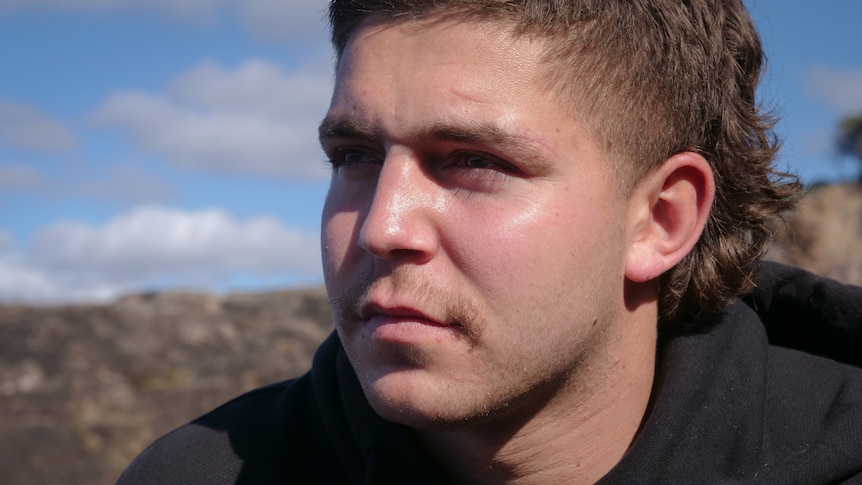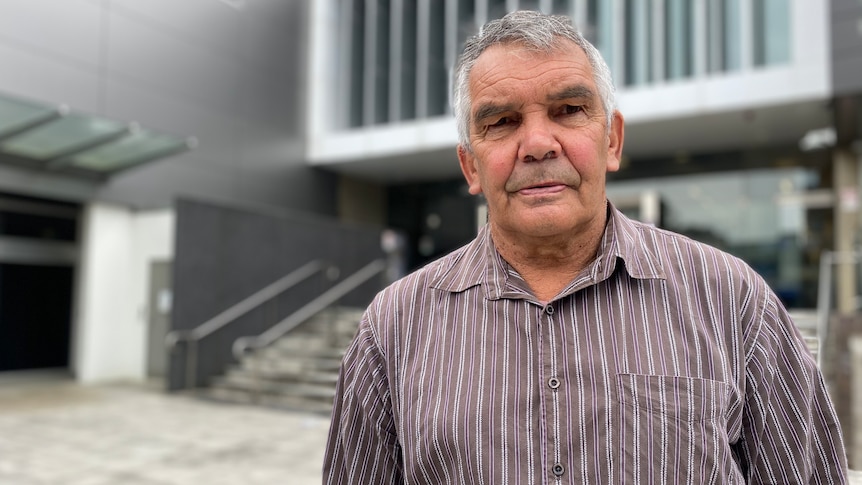A Wollongong man says he feels relieved after spending almost three years wondering if he would be put behind bars for practicing his culture on his traditional lands.
Key points:
-
Two men have been sentenced after pleading guilty to possessing 1,093 shucked abalones they say were for cultural reasons
-
Djirringanj man Anthony Mark Henry, 21, says a native title defense would have been too costly to pursue
- A parliamentary inquiry into cultural fishing is currently underway in NSW
Djirringanj man Anthony Mark Henry, 21, was today fined $8,300 in Bega Local Court, handed a 12-month community corrections order and ordered to complete 50 hours of community service after he pleaded guilty to possessing 1,093 shucked abalone on the NSW South Coast in 2019 .
He was also fined $3,000 after being found with 58 abalone at Black Head Reserve at Gerroa in May the following year.
Outside court, Henry said he felt “relieved” after spending years afraid to go back into the water and the thought of a possible $50,000 fine looming over his head.
“This has been going on since I was 18, and I’m nearly 22, so I’ve had three years wondering if I was going to jail,” he said.
Henry was one of four people initially charged with fisheries offenses after being stopped by NSW fisheries officers on April 2, 2019, north of Tathra.
Two of the people with Henry at the time were underage and had their charges thrown out, while the other man, 21-year-old Walbunja man Brent Gordon Wellington-Hansen from Batehaven, was also fined $8,300 and also handed a 12-month community corrections ordered and ordered to complete 50 hours of community service.
Magistrate Doug Dick told the court he believed the abalone would have been split equally between the four divers to later feed family members for a cultural event and estimated the market value of the catch at around $94,000.
He told the court the charges were “very serious”, adding the marine species must be protected.
“I have to be very careful not to trivialize things,” he told the court.
Henry’s lawyer Tony Cullinan said prosecutors had conceded there was no evidence supporting their claim the abalone was intended for sale when they drew charges of trafficking the species.
He also said prosecutors had made a last-minute decision not to cross-examine Henry over the cultural significance of the event being fished for on the day.
“This is a high caliber young man on the cusp of his life, and he has a great future ahead of him,” Mr Cullinan told the court.
Under current NSW regulations, an Indigenous Australian can legally possess 10 abalone for cultural purposes each day unless a permit is obtained.
Henry grew up in Moruya and is a registered member of the South Coast native title claim currently before the Federal Court of Australia. As a native title holder, Henry is entitled to take fish and shellfish according to traditional law and custom, without limits.
However, Henry said he did not raise or rely on the “native title defence” during the court proceedings due to the costs involved.
“I took out a bank loan for $10,000 for my lawyer, and I had to plead guilty,” Henry said.
“If I had wanted to plead not guilty, it would have cost 30 to 40 grand to fight it out the whole way.”
He said the onus should not be on traditional custodians to claim native title defense when confronted by fisheries officers.
“Fisheries should ask the question at the time because if we don’t bring it up, then we have to provide it through the courts,” he said.
“I had to show my genealogy to prove who I am.”
Henry said in a submission to the court he should have applied for a permit, but navigating the bureaucracy involved was difficult.
Outside court Henry’s grandmother and Djirringanj elder, Aunty Marilyn Campbell, said cultural fishing permits should be made easy to get and supported Henry’s view that alleged traffickers should be given a chance to claim native title.
“This is a white system trying to change our black system,” she said.
“He wasn’t trafficking. He was diving for cultural purposes.”
A parliamentary inquiry into cultural fishing is currently underway in NSW, looking at why legislation passed in 2009 to protect cultural fishing has not been enacted.
An inquiry hearing was held in Narooma on the South Coast last month, with a second hearing set to take place in Sydney on August 19.
The NSW government has told the inquiry that it does support cultural fishing but that it cannot enact legislation until fishing catch limits are agreed on.
Minister for Agriculture Dugald Saunders told the ABC that there had been an agreement around “looking at a moratorium on prosecutions” while the inquiry was ongoing.
However, he said it would mostly focus on low-level prosecutions.
“In many cases, things are only prosecuted when they are at the severe end of the scale,” Mr Saunders said.
“It’s not for taking a couple of extra fish or a couple of extra abalone. It’s for taking hundreds and hundreds and hundreds of extras, not a couple.”
Last week, Walbunja man Keith Nye was sentenced to a 26-month intensive corrective order for two offenses of trafficking indictable quantities of abalone in NSW.
In July, a district court judge dismissed an appeal by Walbunja man John Carriage to overturn his conviction on fishing-related offenses.
Mr Carriage was convicted last year on six fishing offenses after he was found in possession of abalone at South Durras, also on the NSW South Coast, in 2017.
Both men were ordered not to dive for or possess abalone for two years as part of their sentence.
.

